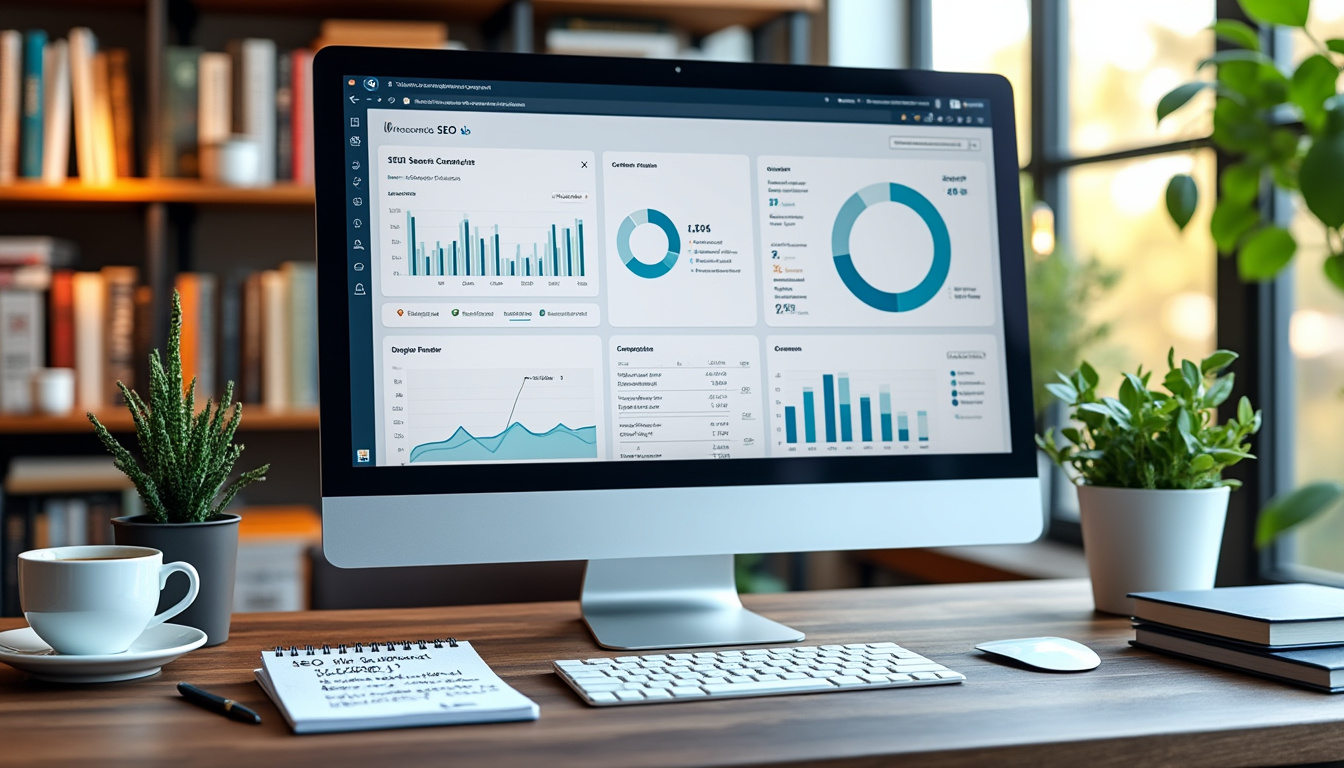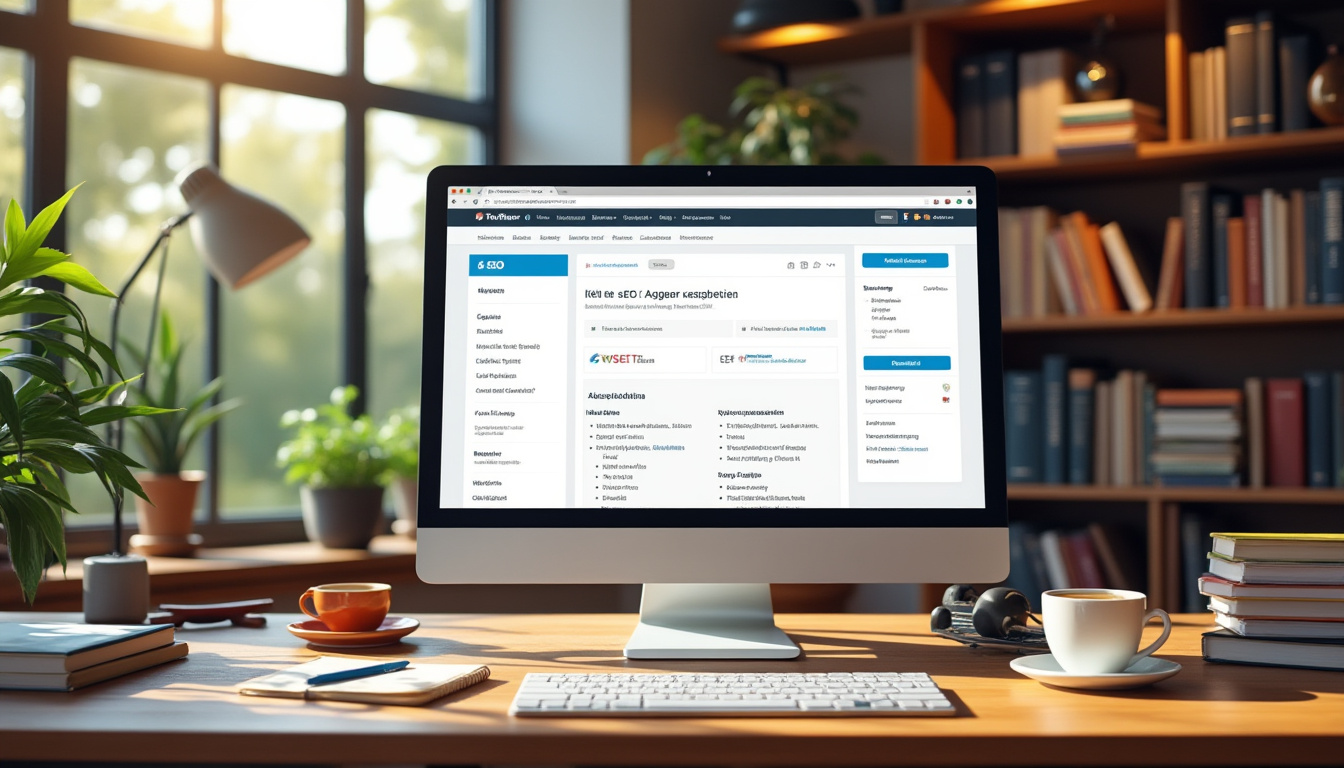To effectively monitor SEO performance on WordPress sites, start by utilizing the All In One SEO (AIOSEO) plugin, which provides easy tracking of your site’s SEO rankings. Conduct regular SEO audits to identify technical and content-related issues, using tools like Google PageSpeed Insights and GTmetrix to analyze site performance. It’s crucial to measure key SEO metrics such as organic traffic, keyword rankings, and site speed, while ensuring your site is easily crawlable by search engines. Additionally, keeping an eye on meta tags and on-page SEO factors, along with monitoring social media integration, can significantly enhance your SEO strategy.
Monitoring SEO performance on WordPress sites is crucial for maintaining a successful online presence. By consistently tracking your website’s performance, you can identify areas for improvement and optimize your content to enhance visibility in search engine results. Understanding the various tools and techniques available for monitoring SEO performance allows you to make data-driven decisions that can significantly impact your site’s organic traffic. This article delves into effective strategies and tools for monitoring SEO performance specifically tailored for WordPress users.
Understanding SEO Metrics
Before diving into monitoring methods, it’s essential to understand the key SEO metrics that matter. These metrics provide insights into how well your website performs concerning search engine optimization. Common metrics include:
Organic Traffic
Organic traffic refers to visitors who arrive at your site through unpaid search engine results. Tracking fluctuations in organic traffic can help you assess the impact of your SEO efforts.
Keyword Rankings
Monitoring your website’s rankings for targeted keywords is vital. Tools like AIOSEO allow you to track keyword performance effectively, so you can adjust your strategy as needed.
Bounce Rate
Bounce rate measures the percentage of visitors who leave your site without interacting. A high bounce rate may indicate that your content is not meeting user expectations, signaling a need for optimization.
Conversion Rate
The conversion rate shows how effectively your site turns visitors into customers or leads. Monitoring this metric can help determine the success of your SEO strategies.
Installing AIOSEO for Seamless Monitoring
Using the AIOSEO plugin is one of the most effective ways to monitor SEO performance on your WordPress site. This tool simplifies the process of tracking various SEO metrics, making it more accessible for users of all experience levels.
How to Install AIOSEO
To get started, install and activate the AIOSEO plugin from your WordPress dashboard. Once activated, you can access a suite of tools designed to help you monitor SEO rankings and overall performance.
Setting Up Keyword Tracking
With AIOSEO, you can track the performance of specific keywords. Input a list of focus keywords to monitor their rankings and adjust your content strategy based on the data provided.
Utilizing Analytics Tools
Aside from AIOSEO, leveraging analytics tools is essential for a comprehensive understanding of your SEO performance. Tools such as Google Analytics and Google Search Console provide invaluable insights.
Google Analytics
Google Analytics tracks visitor behavior on your site, offering metrics like traffic sources, user demographics, and more. By analyzing these metrics, you can determine which SEO strategies are yielding the best results.
Google Search Console
Google Search Console allows you to monitor your website’s presence in search results. It provides information on search queries, including impressions and clicks, which can help you optimize your SEO efforts.
Conducting Regular SEO Audits
Regular SEO audits are essential for identifying potential issues that may affect your site’s performance. An SEO audit involves a comprehensive review of both technical and content aspects of your WordPress site.
Importance of SEO Audits
Auditing your SEO performance can help uncover technical issues, such as broken links, slow loading speeds, and other factors that could negatively impact user experience and search rankings.
Tools for SEO Auditing
Several tools are available for conducting SEO audits, including GTmetrix and PageSpeed Insights. These tools analyze various performance aspects and provide recommendations for optimization.
Optimizing Technical SEO
Technical SEO refers to optimizing your website’s underlying structure to ensure search engines can crawl and index content efficiently. This optimization is critical for improving overall SEO performance.
Ensuring Mobile Responsiveness
With an increasing number of users accessing websites via mobile devices, ensuring your site is mobile-friendly is paramount. A mobile-responsive design can significantly enhance your SEO performance.
Improving Site Speed
Page load speed is a key ranking factor. Use tools like GTmetrix to analyze your site’s speed and receive suggestions for improvement.
Measuring On-Page SEO Effectiveness
On-page SEO plays a significant role in determining how well your website ranks in search results. Monitoring and optimizing on-page elements can lead to improved rankings and greater organic traffic.
Content Quality and Relevance
Regularly reviewing your content for quality and relevance is essential. Ensure that your articles are informative, engaging, and optimized for targeted keywords.
Meta Tags and Descriptions
Understanding the role of meta tags and descriptions is crucial for on-page SEO. Optimize these elements to enhance click-through rates from search engine results.
Social Media and SEO Integration
Leveraging social media effectively can enhance your WordPress site’s SEO performance. Social signals can indirectly influence search rankings as they drive traffic and encourage user engagement.
Building a Social Media Strategy
Creating a robust social media strategy that complements your SEO efforts is essential. Share quality content across your social media channels to attract traffic and enhance visibility.
Encouraging Social Sharing
Encouraging users to share your content on social media can increase its reach and improve engagement metrics, both of which are beneficial for SEO.
Leveraging Content Marketing for SEO
Content marketing is an indispensable part of any SEO strategy. Creating high-quality, SEO-friendly content can drive significant traffic to your WordPress site.
Creating SEO-Friendly Content
To ensure your content is optimized, focus on incorporating relevant keywords naturally, providing valuable insights, and maintaining readability.
Using Visual Elements
Integrating visuals like images and videos not only enhances user experience but can also contribute positively to your SEO performance. Optimize these elements with appropriate alt text.
Tracking and Reporting Results
Monitoring your SEO performance is not a one-time task but requires consistent tracking and adjustments. Establishing a process for reporting results can help you stay on top of your strategy.
Setting Goals and Benchmarks
Define clear goals and benchmarks for your SEO efforts. This framework will help you measure progress and adjust your strategies as necessary.
Utilizing Reporting Tools
Use reporting tools to track your progress over time. AIOSEO provides built-in reporting features that consolidate your SEO data for easier analysis.
Effective monitoring of SEO performance on WordPress sites requires a combination of strategies, tools, and ongoing adjustments. By leveraging plugins like AIOSEO, utilizing analytics tools, conducting regular audits, and optimizing both technical and on-page SEO elements, you can significantly enhance your website’s performance in search engine results.
For further reading on SEO audits, visit this guide. You can also explore other useful tools for auditing and monitoring your WordPress website at this resource. For SEO content creation tips, look into this article.

Monitoring SEO performance on WordPress is crucial for any website owner or digital marketer looking to improve their search engine visibility. This process involves systematically tracking key metrics, changes in rankings, and overall site performance. By utilizing the right tools and strategies, you can gain insightful data on how your site is performing in search results and make informed decisions for optimization.
Understanding the Basics of SEO Monitoring
At its core, SEO monitoring involves evaluating how well your site ranks for chosen keywords and how effectively it drives organic traffic. It is essential to have a clear understanding of the SEO metrics that matter most for your website. Some fundamental metrics to keep an eye on include organic traffic, keyword rankings, and bounce rates.
Installing the Right Plugins
To begin monitoring your SEO performance effectively, consider installing the All In One SEO (AIOSEO) plugin. This robust tool allows you to easily track SEO rankings within your WordPress dashboard. Once AIOSEO is activated, you can customize settings to suit your specific needs, enabling you to receive valuable insights about your site’s SEO health and keyword performance.
Tracking Keyword Rankings
One of the most effective ways to monitor how well your site performs is by tracking your keyword rankings. AIOSEO simplifies this process significantly, allowing you to see where your focus keywords stand in search results. You can also receive notifications of any changes to your rankings, helping you to take proactive measures when necessary. To learn more about using AIOSEO for tracking, you can refer to their comprehensive guide on monitoring SEO rankings.
Analyzing Site Performance
Utilizing tools like Google PageSpeed Insights and GTmetrix can provide you with valuable information about your site’s performance. By conducting regular site speed tests and analyzing SEO aspects, you can identify areas that need improvement. These tools give insights into factors that could affect your site’s ranking, allowing you to optimize accordingly for better SEO performance.
Conducting Regular SEO Audits
Performing regular SEO audits is essential in monitoring your site’s health. These audits help uncover potential technical and content issues that may be impacting your SEO performance. By evaluating your site’s overall structure, including aspects like meta tags, page titles, and content quality, you can ensure search engines crawl and index your site efficiently. Detailed guides can assist you in conducting effective SEO audits, such as understanding meta tags and their importance.
Utilizing Analytics for Insightful Data
In addition to using plugins and auditing your site, integrating Google Analytics helps in obtaining an overview of your SEO performance. Monitor essential metrics, such as organic traffic and user behavior, which can help inform your strategies moving forward. For further exploration of measuring SEO performance metrics, the following resource can be beneficial.
To successfully monitor your SEO performance on WordPress sites, approach the process systematically by utilizing necessary tools and methods. Consistently track your keyword rankings, analyze site performance with reliable tools, conduct routine audits, and leverage analytics for informed decision-making.
Key Approaches to Monitor SEO Performance on WordPress Sites
| Monitoring Method | Description |
| AIOSEO Plugin | Utilizes built-in tools to track SEO changes and rankings easily. |
| Google PageSpeed Insights | Analyzes site speed and offers optimization suggestions for SEO enhancements. |
| GTmetrix | Provides comprehensive performance reports including detailed metrics. |
| Keyword Tracking Tools | Helps in monitoring the performance of specific focus keywords in search results. |
| SEO Audit Tools | Identifies technical and content issues impacting your WordPress site’s SEO. |
| Webmaster Tools | Offers insights into site visibility and indexing status by search engines. |
| Analytics Platform | Tracks user behavior and interaction to assess content effectiveness and engagement. |
Monitoring SEO performance on WordPress sites is crucial for maintaining and improving visibility in search engine results. Effective tracking allows you to identify which strategies are successful and which areas need adjustment. This guide provides practical recommendations for leveraging tools and techniques to monitor SEO performance efficiently.
Install Essential Plugins
One of the best ways to monitor SEO performance on your WordPress site is to utilize dedicated plugins. The All In One SEO (AIOSEO) plugin is highly recommended as it simplifies the process of tracking various SEO metrics. After installation, it offers features to evaluate your site’s optimization status and track keyword rankings, making it easier to make informed decisions about your content strategy.
Utilize SEO Tools for Comprehensive Analysis
In addition to plugins, employ external SEO analysis tools to gain a deeper insight into your site’s performance. Tools like Google PageSpeed Insights, GTmetrix, and Ahrefs can provide valuable metrics on loading speed, keyword rankings, and overall site health. Regularly check these tools to assess how changes affect your SEO results.
Analyze Page Speed
Page speed is a critical factor influencing SEO. Slow-loading pages can lead to high bounce rates. Use tools such as GTmetrix to conduct speed tests and identify issues that may be slowing down your site. Address these issues, whether they involve optimizing images, leveraging browser caching, or minimizing redirects, to enhance user experience and potentially improve rankings.
Perform Regular SEO Audits
Conduct regular SEO audits of your site to keep it in optimal shape. An audit can help you identify technical SEO issues, such as broken links, duplicate content, or missing meta tags. Use checklists to systematically cover all essential factors, ensuring your site is not only search-friendly but also aligns with the latest best practices.
Track Keyword Rankings
Understanding how your focus keywords perform is vital for effective SEO monitoring. Create a shortlist of targeted keywords and use tools like AIOSEO or Google Search Console to track their rankings over time. Regularly analyze this data to see whether content updates are effective or if further adjustments are necessary.
Engage with Analytics
Utilize Google Analytics to gain insights into user behavior on your site. Focus on metrics such as organic traffic, average session duration, and pages per session to understand how users interact with your content. This information will help you determine what types of content resonate with your audience and what needs improvement.
Monitor Bounce Rates
Bounce rates represent the percentage of visitors who leave your site after viewing only one page, indicating content relevance and user engagement. High bounce rates may concern specific pages, suggesting a need for content optimization or a review of user experience. Utilize Google Analytics to monitor this metric and refine your strategies accordingly.
Stay Updated on SEO Trends
The digital landscape is constantly evolving, and staying updated on the latest SEO trends will aid in monitoring performance effectively. Follow industry blogs, attend webinars, and participate in forums to learn about new tactics and algorithm updates. Implementing fresh strategies can give your site a competitive edge and improve your SEO outcomes.









